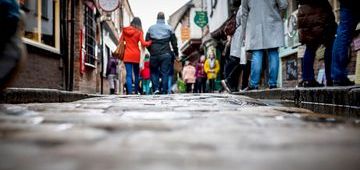Two RSPH Young Health Champions, Jessica Tunks and Ruby Basra, are working as part of a youth advisory panel that has written to the Prime Minister, asking him to take action to end food inequality and support young people to live healthier lifestyles. Jessica and Ruby are part of the Feed Britain Better Coalition, which is developing ideas for what Government and business could do differently in the aftermath of the Covid-19 pandemic, in order to make healthy food as affordable and accessible as possible.
Jessica Tunks is a Young Health Champion at City and Islington Sixth Form College
The Feed Britain Better campaign was organised by a coalition of health organisations who wanted to develop ideas that the Government and business could implement after the COVID-19 pandemic in order to build a healthier Britain. I accepted a position as a representative for RSPH on the Youth Panel because I think that, as one of the richest countries in the world, we could be doing a lot more to end food inequality and encourage healthier lifestyles.
In recent years, there has been an increase in the number of people turning to food banks, which shows that food isn’t as accessible and affordable as it should be. A report published last year also indicated that British youth are among the unhealthiest in Europe, having high obesity rates, as well as poor exercise levels. These facts show that a lot more needs to be done to ensure that everyone in this country is able to lead a healthy lifestyle. I think that it is imperative that the nation puts energy, money, and time, into solving these issues to improve the health of its citizens.
This is especially important as we begin to come out of lockdown imposed due to COVID-19, which has arguably made these issues even worse. Many of the 1.3 million children entitled to free school meals have been unable to receive these during lockdown, as the voucher system put in place by the Government hasn’t been working perfectly. The panic-buying phenomenon observed in lockdown has also made it very difficult for some people to buy staple items such as bread and pasta.
However, as so many restaurants closed their doors to customers, more people have also been cooking meals from scratch. People have also reported being more careful with food waste, and are exercising more. On top of this, we have seen a surge of community spirit in response to the pandemic, with people sharing food with neighbours and looking after vulnerable people in their neighbourhoods. I think this indicates that there is a great opportunity for the country to make real positive changes to our lifestyles in this time.
Therefore, I was really glad to be able to join the Youth Panel, which I have found really interesting. I have been involved in several important discussions with people from many different areas of the country. We have identified some key areas we think are vital for the improvement of the nation’s diet, such as making healthy food more affordable for everyone, and rebuilding healthier high streets. I hope that the suggestions we come up with will be an important part of a plan to make Britain healthier in the future.
Ruby Basra attends Thornden School and is training as a Young Health Champion with LifeLab
I decided to join the Feed Britain Better Youth Panel because I feel passionately about ensuring that everyone gets equal access to a decent meal. I am aware that accessing fresh fruit and organic produce is extremely expensive and for those who don’t have much money this can be a struggle, so I decided to join the group in order to see a change. Being on the Youth Panel is a great opportunity to work with new people and to express my opinion and voice.
I found our first meeting very useful because it gave me an insight into how our high streets will have to change and adapt to this unprecedented time. One of the topics discussed in the meeting was the future food system and for me this means that food banks will have more of a variety of food and that every child will be provided with fresh, nutritious products. I personally think some of the main ideas for community spirit and affordable nutrition is the message of reuse, reduce and recycle – not only is it environmentally friendly but can raise community spirit.
After COVID-19, our new experience of life will obviously change, but when it comes to high streets this will mean that limited quantities of people are going into shops. Business owners will still want to welcome valued customers back and this links to our main discussion of what we look for in shops and cafes. For instance, seating, entertainment and food were key themes throughout this. For some, this could mean a comforting and relaxing atmosphere and to have reassurance after lockdown ends.
After the lockdown lifts, the future of food should be more reliable and simpler. Within this time, we have seen items like flour, eggs and bread be scarce, which meant we have had to adapt to such problems. We need to be mindful of the health of humans and the planet in our future food system.



